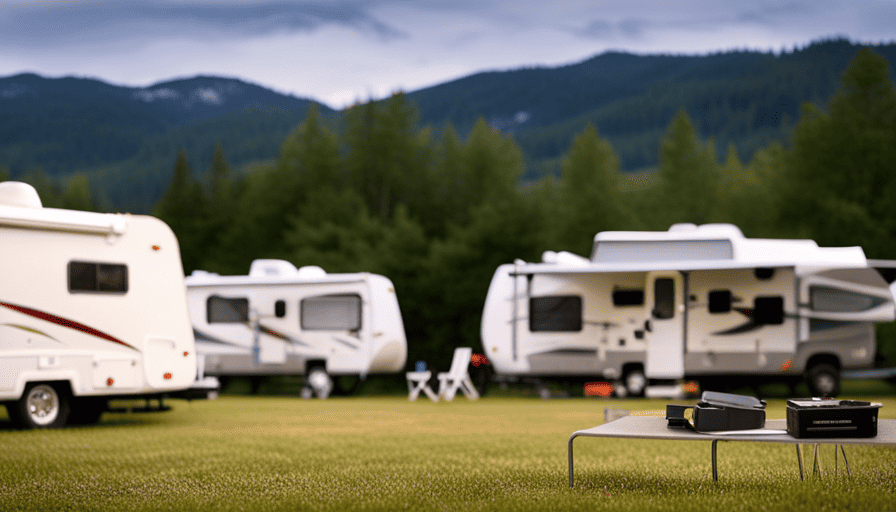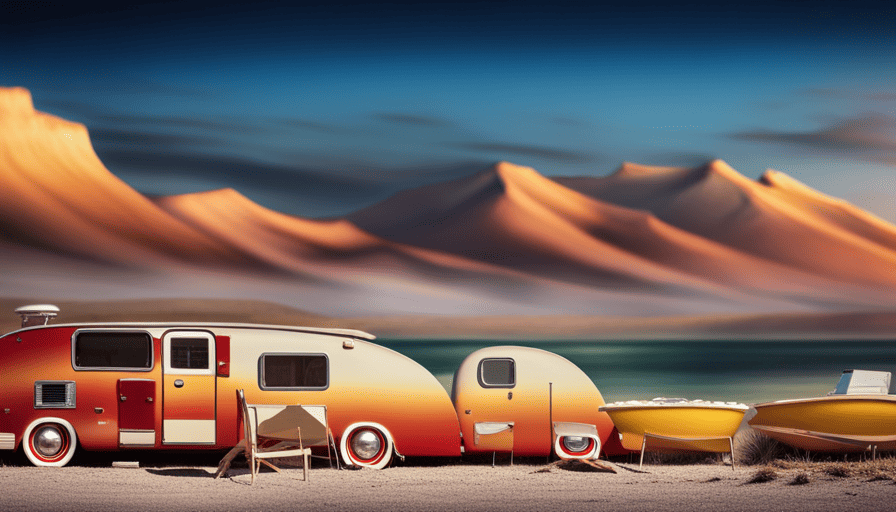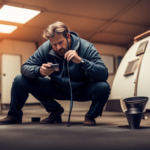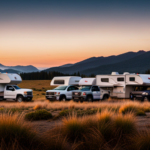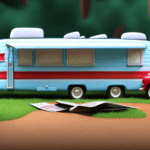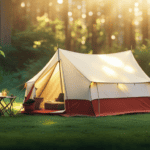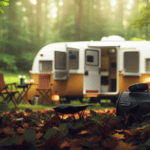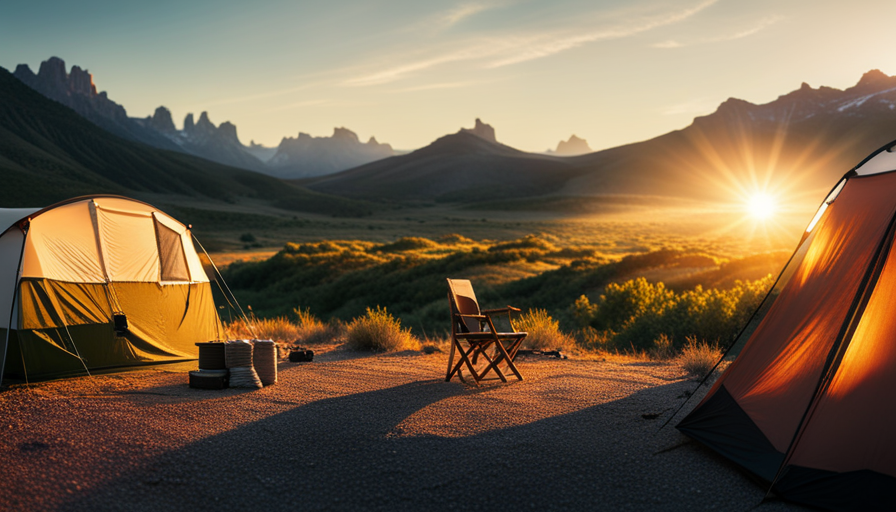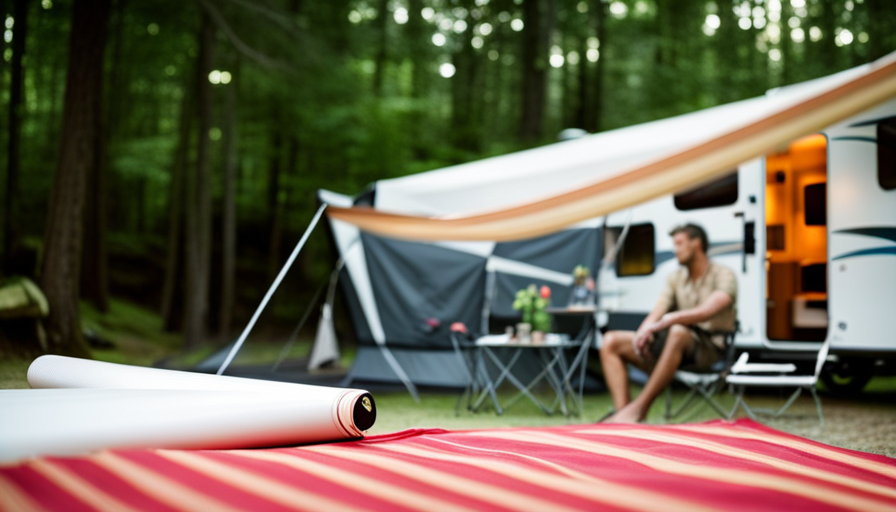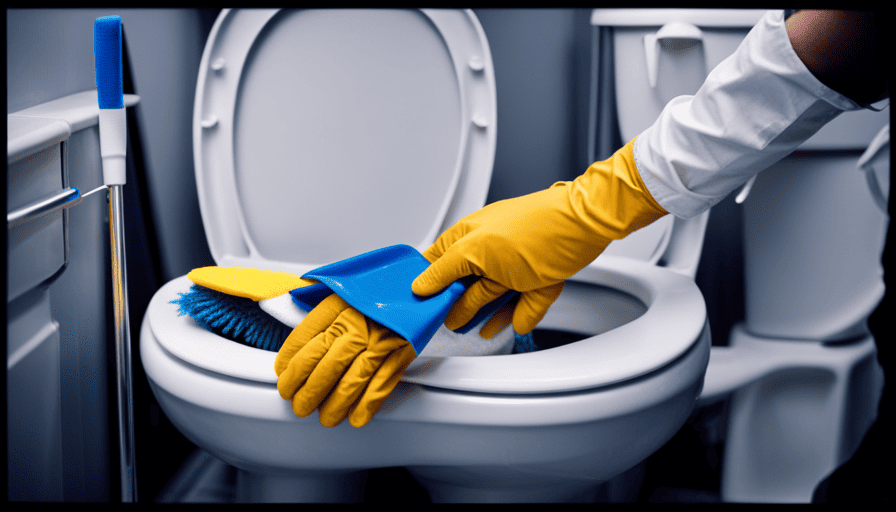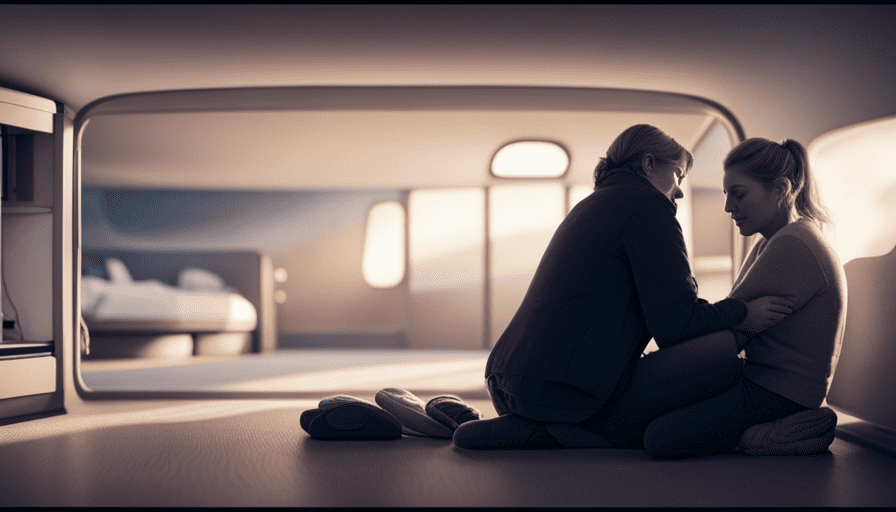So, you’ve made the choice to venture into the world of purchasing a pre-owned camper. Congratulations, my friend, you’re on the brink of exploring a realm brimming with thrill, intrigue, and the opportunity for limitless road adventures and open-air exploits. However, before you leap into this extraordinary venture, allow me to serve as your navigator.
In this article, I’ll walk you through the ins and outs of buying a used camper, sharing my wealth of knowledge and experience along the way. From determining your camping needs and budget to inspecting the nitty-gritty details of a camper’s condition, we’ll leave no stone unturned.
We’ll discuss researching different types of campers, considering size and layout, and checking mechanical and electrical systems. And of course, I’ll share my invaluable tips on negotiating the price and verifying ownership documentation.
So, buckle up and get ready for a crash course in camper shopping. By the time we’re done, you’ll be ready to hit the open road with your trusty new(ish) home on wheels. Adventure awaits, my friend. Let’s dive in!
Key Takeaways
- Determine your camping needs and budget before starting the process of buying a used camper.
- Research different types of campers and consider your camping style and required amenities.
- Inspect the exterior and interior condition of the camper, checking for damages, water damage, wear and tear, and functionality of appliances and fixtures.
- Verify ownership documentation, negotiate the price, and explore financing options before finalizing the purchase.
Determine Your Camping Needs and Budget
Figure out what you want and how much you can spend on a camper. Determining your camping style and budget constraints is crucial when buying a used camper.
First, think about your camping needs. Are you a weekend warrior who only camps occasionally, or do you plan on taking long trips and living in your camper? Consider the number of people who will be using the camper and the amenities you require, such as a bathroom or kitchen.
Next, establish your budget. Determine how much you’re willing to spend on a used camper, taking into account maintenance and repair costs. Remember to also factor in additional expenses like insurance and campground fees. It’s important to be realistic about what you can afford, so you don’t end up with a camper that’s beyond your means.
Once you have determined your camping style and budget, you can move on to the next step of researching different types of campers. This will help you narrow down your options and find the perfect fit for your camping adventures.
Research Different Types of Campers
Exploring various options, it’s a whole new world to uncover when you dive into the vast sea of different types of campers. To help you navigate this world, here are four key factors to consider when choosing the right camper type:
-
Size: Consider how many people will be using the camper and how much space you need for sleeping, dining, and storage. Smaller campers like teardrops are great for solo travelers or couples, while larger ones like fifth wheels provide more room for families.
-
Features: Think about the amenities you want in your camper. Do you need a bathroom and shower? How about a kitchen with a stove and fridge? Make a list of must-haves to narrow down your options.
-
Towing Capacity: If you plan on towing your camper, make sure your vehicle can handle the weight. Different types of campers have different weight requirements, so check your vehicle’s specifications before making a decision.
-
Comparing different camper brands: Research different brands to find out their reputation for quality, durability, and customer satisfaction. Read reviews, talk to other campers, and visit dealerships to get a sense of which brands are known for their reliability.
By considering these factors and comparing different camper brands, you’ll be well on your way to finding the perfect camper for your needs.
Next, let’s consider the size and layout of the camper to ensure it fits your lifestyle seamlessly.
Consider the Size and Layout
When considering the size and layout, you should take into account how many people will be using the camper and the specific needs and preferences of your travel companions. Space utilization is key when it comes to a camper, as you want to make sure there is enough room for everyone to sleep, eat, and relax comfortably. Additionally, storage options are important for keeping your belongings organized and easily accessible during your travels. To help you visualize the different camper sizes and layouts, I have created a table below:
| Camper Size | Sleeping Capacity | Seating Capacity |
|---|---|---|
| Small | 2-3 | 2-4 |
| Medium | 4-6 | 4-6 |
| Large | 6+ | 6+ |
As you can see, the size of the camper directly affects how many people it can accommodate. Once you have determined the size and layout that suits your needs, it’s time to move on to inspecting the exterior and interior condition of the camper.
Inspect the Exterior and Interior Condition
To make sure you’re getting the best value for your money, take a close look at the exterior and interior condition of the camper before making a decision. Inspecting for damages is crucial when buying a used camper. Start by examining the exterior for any signs of dents, scratches, or rust. Pay attention to the condition of the roof, windows, and doors as well.
Look for any indications of water damage, such as soft spots or discoloration. Inside, check for signs of wear and tear, like ripped upholstery or worn-out flooring. Inspect the walls and ceiling for any water stains or mold. Pay close attention to the kitchen and bathroom areas, making sure all appliances and fixtures are in good working condition.
It’s also important to check the electrical and plumbing systems. Look for any loose wires or leaks. Finally, ensure that all the lights, outlets, and switches are functioning properly. By diligently inspecting the exterior and interior condition of the camper, you can make an informed decision on whether it’s worth considering.
Moving on to the next step, let’s check the mechanical and electrical systems.
Check the Mechanical and Electrical Systems
Take a moment to assess the condition of the mechanical and electrical systems – it’s crucial to ensure they are in top shape before making a decision. When inspecting the mechanical aspects of a used camper, there are a few key tips to keep in mind. First, check the engine for any signs of leaks or excessive wear. Look under the vehicle for oil spots or coolant stains, as these could indicate potential issues. Additionally, inspect the tires for proper tread depth and signs of uneven wear, as this could indicate suspension or alignment problems.
In terms of the electrical system, troubleshooting can be a bit more complex. Start by checking all the lights, both inside and outside the camper. Make sure they are all working properly and that there are no flickering or dimming issues. Test the outlets and any appliances to ensure they are functioning correctly. It’s also a good idea to bring a multimeter to check the voltage levels of the battery and charging system.
By thoroughly inspecting the mechanical and electrical systems, you can identify any potential problems and make an informed decision about the camper’s overall condition. Once you have assessed these areas, it’s time to move on to evaluating the maintenance and service history.
Evaluate the Maintenance and Service History
Assessing the maintenance and service history of the camper can provide valuable insights into its overall reliability and potential future issues.
When evaluating a used camper, it’s important to consider its age and mileage. Older campers with high mileage may have more wear and tear, requiring more frequent repairs and maintenance. It’s also crucial to check for any water damage or leaks, as these can lead to costly repairs and potential structural issues.
By thoroughly examining the maintenance and service records, you can determine if the camper has received regular and proper care. Look for evidence of routine maintenance such as oil changes, tire rotations, and brake inspections. Additionally, check if any major repairs or replacements have been done, such as engine overhauls or roof repairs.
A camper with a well-documented maintenance history is generally a good indicator of a reliable and well-maintained vehicle. On the other hand, if there are gaps in the records or signs of neglect, it may be a red flag that the camper has not been properly maintained.
Assessing the maintenance and service history allows you to make an informed decision about the camper’s overall condition and potential future costs. With this knowledge, you can negotiate the price and financing options based on the camper’s maintenance needs and potential repairs.
Negotiate the Price and Financing Options
Once you’ve thoroughly examined the maintenance and service history, it’s time to roll up your sleeves and start negotiating the price and financing options, putting your bargaining skills to the test.
Price negotiation is a crucial step when buying a used camper, as it allows you to get the best deal possible. Start by researching the market value of similar campers to have a baseline for negotiation. Take into consideration the condition, age, and features of the camper you’re interested in, as these factors can affect its price. Be prepared to make a reasonable offer, but also be open to counteroffers from the seller.
In addition to negotiating the price, it’s important to explore your financing options. Determine your budget and consider how much you can afford to pay upfront and in monthly installments. Shop around for different financing options, such as loans from banks or credit unions, to find the best terms and interest rates. Compare the offers and choose the one that suits your financial situation the most.
Once you have negotiated the price and explored financing options, it’s time to verify the title and ownership documentation. This step ensures that the camper belongs to the seller and that there are no liens or outstanding debts associated with it. It’s essential to complete this process before finalizing the purchase to avoid any legal or financial issues down the road.
Verify the Title and Ownership Documentation
Make sure to verify the title and ownership documentation before finalizing your purchase to protect yourself from any potential legal or financial headaches. This step is crucial to ensure that you’re buying a used camper from the rightful owner and that there are no liens or outstanding debts associated with it.
Here are three important things to consider when verifying the title and ownership documentation:
-
Title Verification: Firstly, check if the title is clear and not salvaged or rebuilt. Request the seller to provide you with the current title and cross-check the vehicle identification number (VIN) on the title with the one on the camper. Additionally, verify that the title is in the seller’s name and matches their identification. If there are any discrepancies or concerns, contact the local Department of Motor Vehicles (DMV) to clarify.
-
Ownership Documentation: Along with the title, ask the seller for any additional ownership documentation, such as the bill of sale or transfer of ownership forms. These documents should provide a clear chain of ownership and help verify that the seller has the legal right to sell the camper. It’s also important to ensure that there are no outstanding loans or liens against the camper, as this could affect your ownership.
Remember, verifying the title and ownership documentation is an essential step in the used camper buying process. Once you’ve completed this step, you can proceed to the next section about test driving and taking a close look at the camper to ensure its overall condition and suitability for your needs.
Test Drive and Take a Close Look
Take the camper for a spin and carefully inspect its condition to ensure it meets your needs and expectations. When buying a used camper, it’s crucial to find a reputable seller. Look for someone who has a good reputation and is known for selling quality vehicles. This will give you peace of mind knowing that you’re buying from a trustworthy source.
Once you’re ready to test drive the camper, there are a few things to keep in mind. First, make sure you have a valid driver’s license and insurance that covers the camper. This will protect you in case of any accidents during the test drive. Next, pay attention to how the camper handles on the road. Test its acceleration, braking, and maneuverability. Check for any unusual noises or vibrations that could indicate mechanical issues.
In addition to the test drive, take a close look at the camper’s overall condition. Inspect both the interior and exterior for any signs of damage or wear and tear. Look for leaks, rust, or any structural issues that may need to be addressed. Don’t be afraid to ask the seller questions about the camper’s history and maintenance records.
By thoroughly inspecting and test driving the camper, you can ensure that it is in good condition and meets your needs. Once you’ve completed this step, you can finalize the purchase and start enjoying your adventures!
Finalize the Purchase and Enjoy Your Adventures!
Now that you’ve thoroughly inspected and test driven the camper, it’s time to finalize the purchase and embark on your exciting adventures! Here are three important steps to consider when finalizing your purchase and buying from a private seller:
1) Negotiate the price: After you’ve inspected the camper and are satisfied with its condition, it’s time to negotiate the price with the seller. Do some research beforehand to know the fair market value of the camper, and use that information to guide your negotiations. Be prepared to walk away if the seller isn’t willing to meet your price.
2) Secure financing options: If you’re not paying for the camper in cash, you’ll need to secure financing. Research different financing options available to you, such as loans from banks or credit unions. Compare interest rates and terms to find the best option for your budget. Once you’ve secured financing, you can proceed with the purchase.
3) Complete the paperwork: It’s crucial to ensure that all the necessary paperwork is completed correctly. This includes the bill of sale, title transfer, and any other required documents. Double-check that the information is accurate and that both parties sign all necessary forms. This will protect you legally and ensure a smooth ownership transition.
By following these steps, you can confidently finalize your purchase from a private seller and begin enjoying your adventures in your new camper. Safe travels!
Frequently Asked Questions
Are there any hidden costs or fees associated with purchasing a used camper?
Yes, there can be hidden costs or fees associated with purchasing a used camper. It’s important to thoroughly assess the condition of the camper during the inspection process to uncover any potential issues that may require repairs or maintenance. These costs can add up quickly, so it’s crucial to budget for them.
Additionally, there may be fees for registration, taxes, or transferring ownership that you should be aware of before finalizing the purchase.
How do I ensure that the camper I am interested in meets safety standards?
To ensure that the camper I’m interested in meets safety standards, I start by conducting thorough inspections and certifications.
I carefully examine the maintenance and repair history to identify any potential issues. Common safety concerns include electrical problems, gas leaks, and structural damage.
I also use a safety checklist to ensure all essential features are in good working order.
Researching the model and brand beforehand is crucial to understand any known safety issues and make an informed decision.
What kind of insurance coverage do I need for a used camper?
When it comes to insurance for a used camper, there are a few options to consider. You’ll want to ensure that your coverage limits are adequate to protect your investment.
Comprehensive coverage can help with damages from accidents, theft, or natural disasters. Liability coverage is essential in case someone gets injured while on your camper.
Additionally, you may want to consider additional coverage for personal belongings or roadside assistance. It’s crucial to review different insurance policies and choose the one that fits your needs best.
Can I finance a used camper through a bank or do I have to use a specialized lender?
I can finance a used camper through a bank or a specialized lender. When considering financing options, it’s important to understand the loan requirements.
Banks typically offer competitive interest rates and flexible terms for loans on used campers. They may require a down payment and a good credit score for approval.
On the other hand, specialized lenders may have specific requirements for financing a used camper, such as a lower credit score threshold or a higher down payment.
What should I do if I discover any issues with the used camper after purchasing it?
If I discover any issues with the used camper I purchased, I need to take immediate action. First, I should document all the problems and gather evidence, which can help me negotiate the price with the seller.
Next, I would reach out to a professional mechanic or camper specialist to assess the extent of the issues. Armed with their expert opinion, I can then negotiate a fair price adjustment or decide whether to walk away from the purchase altogether.
Conclusion
After meticulously researching, inspecting, and negotiating, I’ve finally found the perfect used camper. Its size and layout are exactly what I need for my camping adventures. The mechanical and electrical systems are in excellent condition, ensuring a smooth and worry-free journey.
As I test drive it, a feeling of excitement and anticipation fills the air. The moment of truth has arrived. Will this be the camper that becomes my home away from home? The answer awaits, ready to unveil a world of unforgettable adventures.

